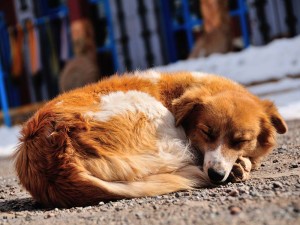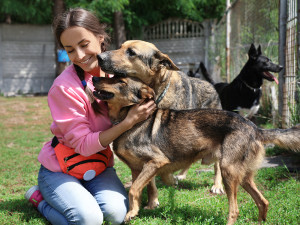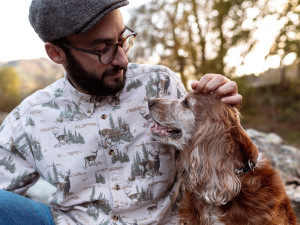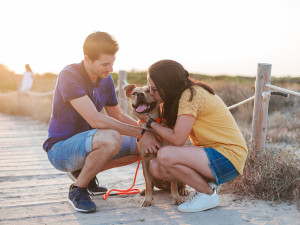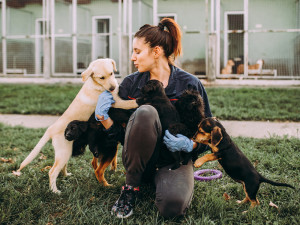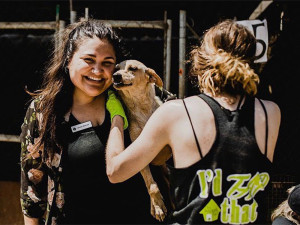This Rescue Organization Has Made a Puerto Rican Island a Safe Haven for Pets
Vieques is now an island where “you don’t see roaming, starving dogs and cats.”

share article
When Laurie Mosher first vacationed on the Caribbean island of Vieques, Puerto Rico years ago, she had that all-too-familiar feeling of not wanting to leave when it was time. Even when she went back to her native Canada, that feeling never left. So, naturally, in 2015, when Mosher and her husband decided to purchase a second home, they returned to the sunny oasis. Something else happened, though. While building this new home, Mosher came across a roaming street dog nearby who stole her heart, and she decided to take him back to Ontario with her.
She named the pup J. Edgar after the first FBI director, J. Edgar Hoover. “He was a force to be reckoned with, a little tiny wire-haired thing and cute as a button,” Mosher, cofounder of Our Big Fat Caribbean Rescueopens in a new tab (OBFCR), remembers. Sadly, six months later, J. Edgar passed away from complications with heartwormopens in a new tab. But similar to his namesake, he’d leave a lasting legacy — albeit one that’s far less complicated. The experience introduced Mosher to a slew of issues facing the massive population of strays in Vieques and inspired her to make a difference.
During the initial process of transporting J. Edgar to Canada, she met Laura Cohen, who’d helped foster the pup while Mosher dealt with the logistics of the move. The pair didn’t know it then, but J. Edgar would become the first dog saved by OBFCR. Mosher says she and Cohen are “very alike in our approach and we said, ‘OK, this is awful. What’s happening here? Let’s fix it.’”
OBFCR started small.
In the beginning, Mosher and Cohen ran the rescue out of her newly built house. They fostered five to six street dogs at a time before connecting with groups in Canada and the U.S. to fly them to. And then came Hurricane Maria.
“That was all well and good until Maria hit,” Mosher recalls. The Category 5 hurricane devastated Vieques when it hit in September 2017 and left a brutal impact on the already struggling canine and feline populations. “Maria was just horrific. There were dogs just wandering aimlessly on the streets, people abandoned them. The infrastructure was gone,” Mosher explains, before adding that even access to dog food became difficult at the time.
But the tragic event was a watershed moment for Mosher and Cohen, as they realized the best thing to do was to address these issues at the source. “We said, ‘No, the problem is in Vieques, so we’re going to solve the problem [there].’ Then, we started our first free clinic in my living room,” Mosher says.
To make enough space for the clinic, they moved all of Mosher’s furniture out of the living room, leaving much of it in the garden. Soon, they also found a vet who believed in their cause, and he brought a team in to help spay and neuter local dogs. During their first clinic, they sterilized 60 dogs to help put a cap on overpopulation.
This would become a huge part of what OBFCR does. For the two years following, they’d continue to run the operation out of Mosher’s living room before having a larger facility donated to them.
Mosher estimates that they’ve now sterilized at least 6,000 dogs and cats, the benefit of which can be seen every day on the island. As she puts it, “I think Vieques, at this point in time, is probably one of the very few Caribbean islands that you don’t see roaming, starving dogs and cats. It’s really made a huge impact.”
Community is the priority.
A huge reason behind the success of OBFCR’s campaign is that they offer these spay-and- neuter services for free. Vieques is an island off of Puerto Rico, where the majority of its citizensopens in a new tab live below the poverty line, with some estimates placing the rate over 70 percentopens in a new tab. “The only way we were going to help our neighbors and their pets, is by being free,” Mosher explains. The nonprofit also offers other flexibly priced and free vet services.
When they first started OBFCR, the sight of six to eight dogs living in one yard or at one residence was not unusual. The issue was that people would get one or two pets, never spay or neuter themopens in a new tab, and they’d procreate like wild animals. But Mosher adds that this was rarely due to neglect and that the people of Vieques generally love their pets. They simply didn’t have the resources to address the problem. Not to mention, the information on how crucial pet serialization is was not regularly available. That is it wasn’t — until OBFCR showed up.
Mosher credits their community outreach over the first few years as the crux that made the early uptake of their services possible. In the early years, Mosher and her team would go door to door in Vieques offering things like food, collars, leashes, and flea and tick medications to those who’d answer. While she admits that there isn’t data to support it, she believes that this is why people showed up to those early clinics. “It became personal, but it also built a level of trust,” she adds.
What’s in a name?
Of course, a couple of years in there was one thing still missing for Mosher and Cohen: They didn’t have a name. When they started doing the free clinics, Mosher realized that they were truly getting serious about this work. Therefore, they needed a fitting moniker. Unfortunately for the rom-com fans reading this, My Big Fat Greek Wedding had no influence on OBFCR.
During a brainstorming session with her husband and kids, Mosher heard the phrase “big fat” and knew there was gold there. But first, she did some market research to confirm her encouraging suspicion. Mosher plugged the title into a name-rating website. “It came back [with a score of] 10 out of 10. And so we said, ‘OK, Our Big Fat Caribbean Rescue it is,’” she remembers.
According to Mosher, the name has helped OBFCR stand out among not just bystanders but also other organizations at conferences and fundraising events. I’d argue, however, that it’s their extensive passion for the animals and dedication to the community that has really helped elevate the group.
In addition to the free clinics and community outreach programs, Mosher and Cohen continue to transport pets in need of homes to North American shelters, where they’ll have a better chance of being adopted.
Like most nonprofits, OBFCR’s most frustrating and exhausting hurdle is funding. They’re only able to offer these services for free or at low-cost, thanks to the donations they receive, but money can run low quickly, especially when regularly arranging air travel for animals. Mosher adds that even the smallest contributions can make a massive difference. “Day to day, what keeps us going are the $5 and $10 donations that come through Facebook and Instagram and stuff like that. It adds up, it really does add up,” she confirms.
If you’d like to contribute to OBFCR’s work, you can do so on their websiteopens in a new tab, which is also accessible in Spanish (maybe forgo that Starbucks Refresher today, and send your cash to these folks instead).
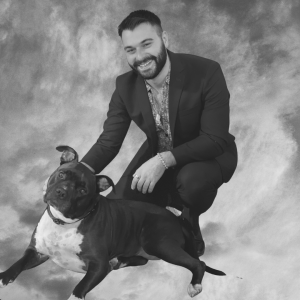
Sean Zucker
Sean Zucker is a writer whose work has been featured in Points In Case, The Daily Drunk, Posty, and WellWell. He has an adopted Pit Bull named Banshee whose work has been featured on the kitchen floor and whose behavioral issues rival his own.
Related articles
![Stray dog sleeping on the street]() opens in a new tab
opens in a new tabHow to Adopt a Dog from Another Country
Four simple steps to follow after falling in love abroad.
![Female volunteer playing with rescue dogs at an outdoor animal shelter]() opens in a new tab
opens in a new tabHow to Start an Animal Rescue
If you are ready to take the plunge and start your own dog or cat rescue, this guide will help you set up a successful non-profit.
![Man with beard and wearing glasses and a grey hat sitting outside petting the head of his old foster dog]() opens in a new tab
opens in a new tabFoster Parenting 101: How to Be the Best Caregiver to Your Guest Pets
All the steps you can take.
![Couple hug their Pit Bull dog outside on the beach.]() opens in a new tab
opens in a new tabHow to Help the Rescue Pets Who Seem to Be Stuck at Shelters Forever
And why the problem of long-term rescue and foster animals persists.
![Woman holding dogs at an animal shelter]() opens in a new tab
opens in a new tab10 Ways Animal Shelters Are Upping Their Game
New trends we can totally get behind.
![A woman smiling with a dog at an animal rescue service event.]() opens in a new tab
opens in a new tabAs Shelters Fill Up With Dogs, The Animal Pad Volunteers Roll Up Their Sleeves
The San Diego-based rescue’s 300 volunteers take saving Mexican street dogs as seriously as a full-time job (but have fun doing it).
